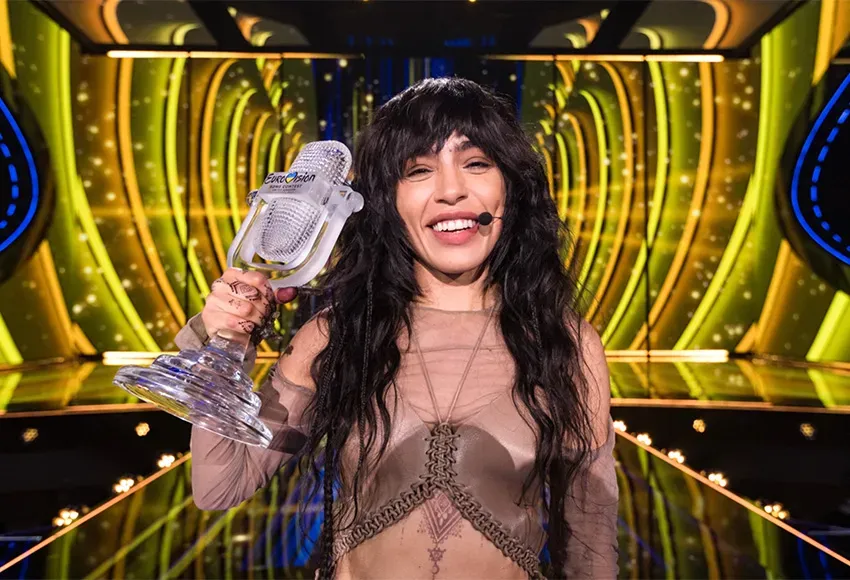The 2023 Eurovision Song Contest - among the world's most watched non-sporting events, with an audience of about 170 million, give or take - is now in the history books.
Sweden's legendary Loreen - and her hyperlong fingernails - bested 25 competitors with a polished, dramatic performance of "Tattoo," making her only the second artist (and first woman) to win the contest twice. She came out on top in 2012 with "Euphoria"; Ireland's Johnny Logan won in 1980 and 1987.
Sweden has now also tied Ireland for the most wins in Eurovision's 67-year history, with seven each.
But what is less known about Loreen (born Lorine Zineb Nora Talhaoui) is that she came out as "quite simply" Bisexual in a 2017 interview.
She was not the only Queer representation this year, though, in what's come to be known as "the Gay Olympics," which has featured such Queer winners as Dana International for Israel in 1998 (Trans), Conchita Wurst for Austria in 2014 (Gay), and Duncan Laurence for the Netherlands in 2019 (Bi, engaged to a man), as well as Katrina (& the Waves) Leskovich for the UK in 1997 and Marija Šerifović for Serbia in 2007, who both won before coming out as Lesbian.
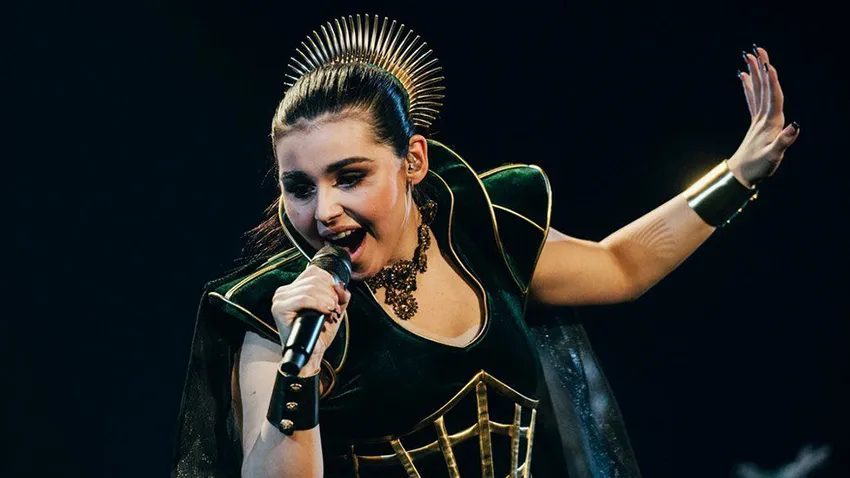
Norway: Alessandra and accepting yourself
Norway's Alessandra Mele, who was giving kind of a Xena vibe in her performance, is also openly Bisexual; she currently has a boyfriend.
About her song "Queen of Kings," which came in fifth, she told Eurovisionfun.com, "This song shows the power of women, but also the power of all people, about how important it is to feel yourself. I am Bisexual, and when I lived in Italy [where she was raised], I had to hide who I was, because some of my friends and relatives would not approve of it.
"So I think it's important to accept who we are, without caring about the opinion of others, as well as to accept that there are also bad moments in life from which we become stronger!"
However, she also told Aussievision.net, "Now I have to say something, and that is that I don't like to call it Bisexual. And that's because you kind of put it in a box. But the definition you give is Bisexual, so I'll just say that."
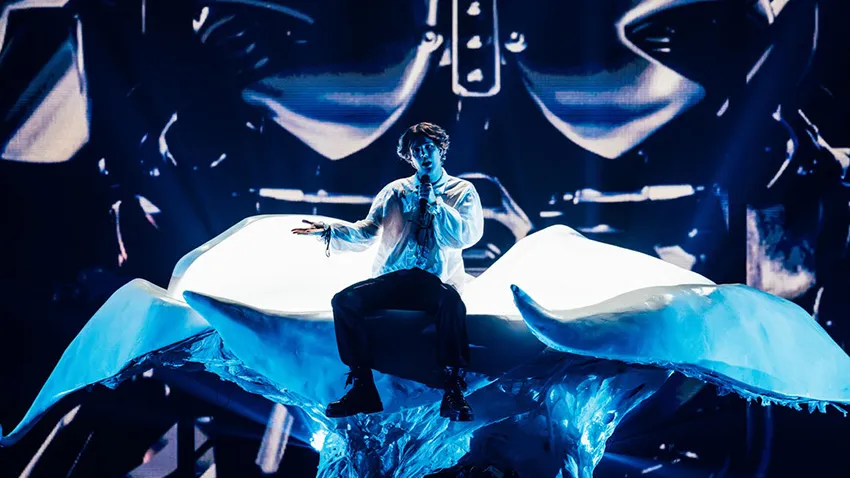
Serbia: Luke Black wakes up
Serbia was represented by Luke Black (born Luka Ivanović), who is Gay and currently lives in London. His melodramatic, industrial-lite song inspired by video games, "Samo mi se spava" (I Just Want to Sleep), was about being isolated during the pandemic, and people needing to wake up so evil can be defeated. It came in 24th.
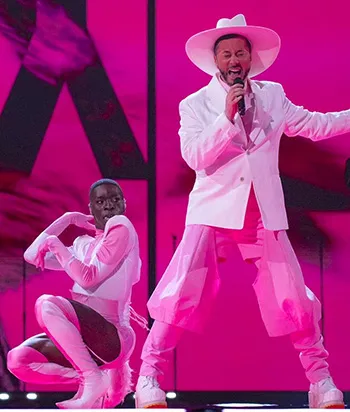
Belgium: Gustaph celebrates self-love, chosen family
But the Award for Queer Excellence goes to Gustaph (born Stef Caers) of Belgium, age 42, who has been out since he was 14. He is a former member of the iconic Queer electronic collective Hercules and Love Affair.
This is actually his third time at Eurovision: he joined Sennek in 2018 and Hooverphonic in 2021 as a backing vocalist, both of whom represented Belgium.
This year, he headlined. His unapologetic anthem "Because of You" was influenced by house music, sending listeners back to the late '80s and early '90s.
The lyrics tell the story of being yourself despite what others think:
"Remember when they told us / 'You're not good enough' / Then you came into my life / And you changed my world for good / You told me to love myself a bit harder than yesterday / 'Cause life is too short and we sure got to celebrate ...
"Remember when they tried to break us / But look at us now / You told me the right things at the right time / You got me feeling wild / See now I love myself much more than I did yesterday / 'Cause life is too short and we sure got to celebrate..."
Gustaph told the fan site Wiwibloggs earlier this year, "['Because of You'] is really about the chosen family, which happens a lot in the Queer world. [But] I think 'Because of You' is universal. [It's for] anyone who helps you to where you are in life and helps you to say, 'This is who I am and I love who I am because of you.'"
The joyful performance in the grand final incorporated background visuals by Gustaph's husband – featuring ballroom performers and drag artists – and backup vocals by good friends of his; the vogue dancer PussCee West joined them all on stage and "walked that duck," to the delight of the (very Gay) audience.
About why it's so important for him to represent his people, Gustaph said, "I think mostly because of my story and what I went through. When starting out I had to hide parts of who I was. If I have a chance to do anything on a mainstream platform, I am going to use the voice that I have to represent my people who are not always represented...
"I did feel sort of a pressure from the recording industry to keep my sexuality as mysterious... That was confusing for me. It translated as 'you can make it in the industry, but just don't be yourself,' so that kind of messed up my head."
"Because of You" won Belgium's national selection in January by one point. Early criticism of it focused on it being "dated." It was too Gay for others.
As Gustaph told Eurovisionworld.com: "I am fine with you not liking the song – that's how it works with music. But some people do go a bit far to the point they criticize me for my sexuality or for the way I look. It's not necessary. Eurovision should be seen as a safe space so everyone can be who they want to be, like what they want to like and support whoever they want to support without bringing others down."
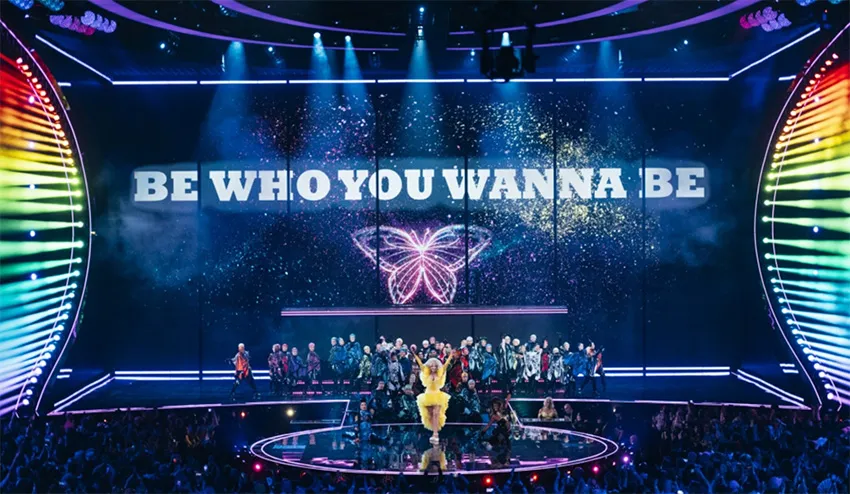
As Gay as it gets
If that weren't enough, the second semifinal featured an interval act by three drag performers: Miss Demeanour, Miss Mercedes Bends, and Tomara Thomas, along with the Podilya dance ensemble from Ukraine. Titled "Be Who You Wanna Be," the flashy, rainbow-colored production was a medley of "Free Yourself," "Free Your Mind," "Free" (do you sense a theme?), and the 2018 Australian entry, "We Got Love."
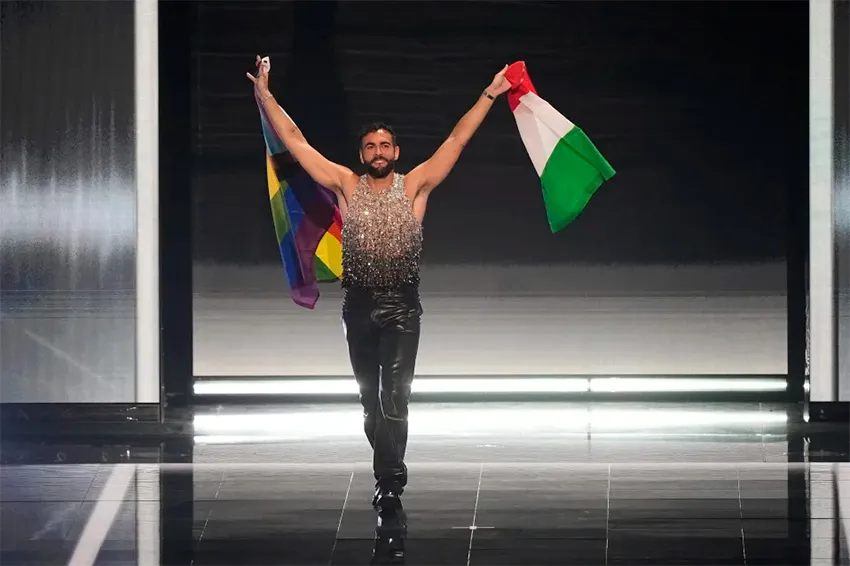
Of other Queer interest
Handsome Marco Mengoni of Italy – around whom has swirled much speculation about his sexuality – walked onto the grand final stage during the show's opening with both the Italian flag and the Progress Pride flag, a gesture that has already sparked more speculation.
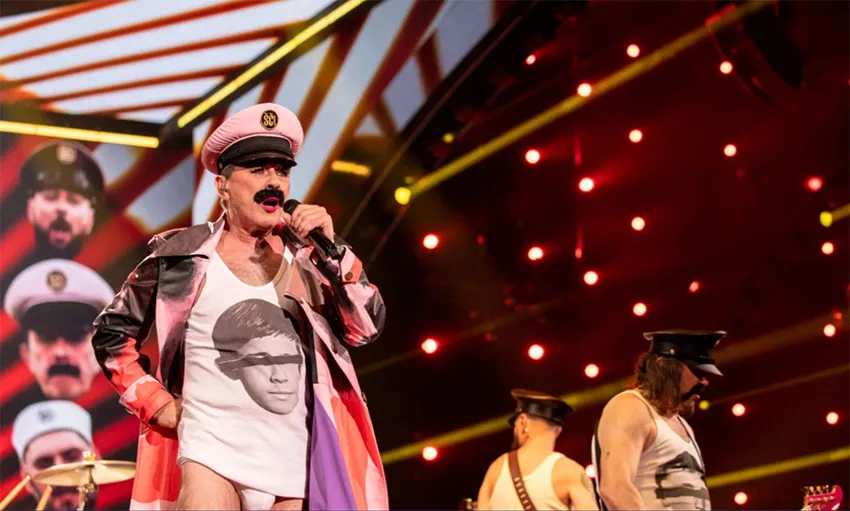
Croatia's eclectic all-male rock group Let 3 (founded in 1987) stripped down to their tank tops and underwear during a raucous performance of "Mama ŠČ!," an antiwar, antiauthoritarian statement.
Portugal's Mimicat and backup dancers put on a lively cabaret number with "Ai coração," and Austria's Teya & Salena's clever and campy "Who the Hell Is Edgar?" added a comic spin to the plight of being a songwriter, especially as a woman.
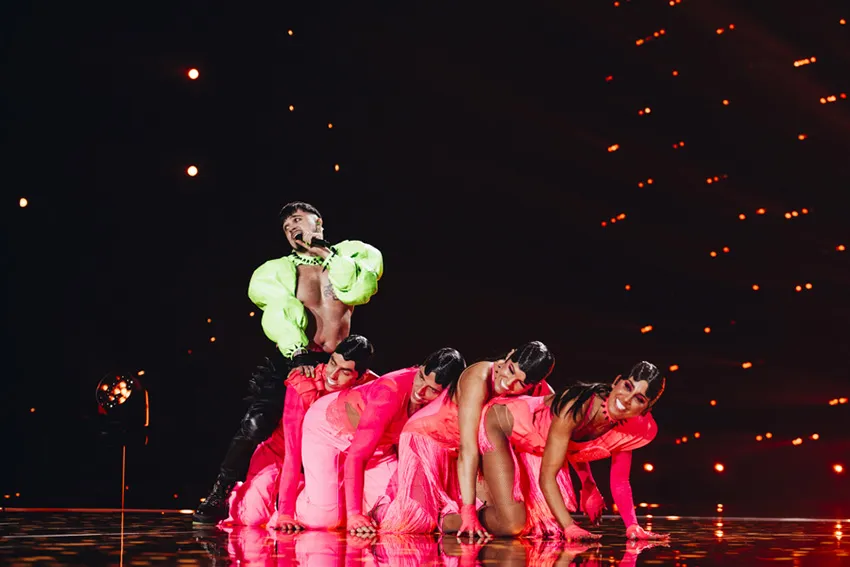
But the crowd favorite – and winner of the worldwide televote – was Finland's irrepressible Käärijä (born Jere Pöyhönen), who performed his techno-rock-pop bop "Cha Cha Cha" in a lime-green bolero exposing his bare chest, accompanied by rictus-grinning ballroom dancers in bright pink. The song, about needing a few piña coladas to loosen up and dance, electrified the arena but finished second in the end, unable to overcome Loreen's lead from the 37 national juries.
About this year's shows
Hannah Waddingham (Ted Lasso), Alesha Dixon (Britain's Got Talent), and Ukrainian rocker Julia Sanina co-hosted all three shows. They were joined in the grand final by openly Gay Graham Norton, who has been commentating on Eurovision for the BBC since 2009.
Liverpool in the United Kingdom (last year's runner-up) was chosen as the venue for the contest on behalf war-torn Ukraine, which was the victor in 2022, but there was a strong emphasis on Ukrainian musical acts and culture during each of this year's programs, in addition to tributes to legendary musical artists who call this UNESCO City of Music home.
Both semifinals and the grand final were (and still are) on Peacock in the US, the latter with or without commentary by openly Queer Johnny Weir (of Olympic figure skating fame), who knows his Eurovision stuff and was also joined by 2009 winner Alexander Rybak of Norway.
The performances of the top 10 finishers can be seen at https://youtu.be/3kn50WdjQ-E. All the full shows are still available on Peacock in the US, or on Eurovision's YouTube channel (https://www.youtube.com/@EurovisionSongContest) using a VPN service set to a participating country. All this year's entries' music videos (most with English captions) and many performances can be seen at https://bit.ly/431FW4k


